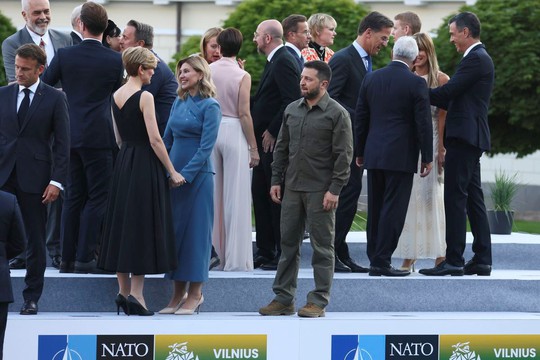Zelensky: Loneliness at the summit
Ukrainian President Volodymyr Zelensky jolted a summit of NATO leaders by blasting their joint statement on his country’s prospective membership, decrying its lack of a concrete timeline as “unprecedented and absurd,” informs “The Washington Post”.
In a fiery tweet, Zelensky frustrated Ukraine’s advocates inside the alliance who believed they had secured a win for Kyiv by pushing the United States, Germany and other reluctant countries to consent “to extend an invitation to Ukraine to join the alliance when allies agree and conditions are met,” in the words of the declaration painstakingly hammered out through negotiations among the 31 NATO members.
Ukraine has demanded a definitive timeline for NATO membership that includes specific steps and milestones. But many NATO countries are cautious about risking direct war with Russia, and they have been searching for a way to balance Ukraine’s hopes with pragmatic security calculations.
The sharp statement was the latest gamble by the Ukrainian president, who has not hesitated to criticize his backers when he senses a moment to seize more support for Ukraine. NATO diplomats, who like others spoke on the condition of anonymity to speak frankly about the tense talks, said they suspected he was using the tweet as a negotiation tactic.
Zelensky seemed especially upset at the idea that conditions were not ripe even for an invitation to join, let alone for full membership.
He claimed that NATO leaders were not serious about inviting Ukraine to join the alliance and complained that their approach indicated they instead wanted to keep its membership as a bargaining chip for eventual negotiations with Russia.
“Uncertainty is weakness,” he wrote, as he prepared to join the allies for meetings in Vilnius. “And I will openly discuss this at the summit.”
Zelensky’s blunt, 170-word Twitter missive surprised policymakers at the summit.
For his part, Biden has been more hesitant than leaders of many other NATO member countries about Ukraine’s bid, saying that in addition to resolving the ongoing war with Russia, Kyiv would need to implement internal reforms to become eligible.
Members of the U.S. delegation were furious with Zelensky’s tweet, according to an official familiar with the situation who spoke on the condition of anonymity because of the sensitive diplomatic considerations.
The spat over Ukraine’s membership threatened to overshadow the significant aid and support approved for the country’s fight against Russia.
French President Emmanuel Macron announced a shipment of long-range missiles that have proven highly effective against Russian targets. Germany announced air defense systems and armored vehicles. Biden plans to announce additional support soon. And NATO leaders approved a slew of tough language against Russia and gave Ukraine the power to convene NATO ambassadors when Kyiv wants to discuss security threats.
Zelensky struck a more conciliatory tone after arriving in Vilnius, where he told a crowd of thousands that he continued to have “faith” in a strong NATO that could become stronger with Ukraine.
“I would like this faith to become confidence — confidence in the decisions that we deserve, all of us deserve, and every warrior, every citizen, every mother, every child expects,” he said in a statement on Twitter.
But Zelensky’s words blasting the alliance stood in stark contrast to the image of Western harmony that Biden and his aides had been projecting as they credited the president with helping to break an impasse that had stalled Sweden’s accession into NATO.
As the talks unfolded, the more hawkish members of the alliance — the Baltic states, Poland, and others in Central and Eastern Europe with unpleasant memories of communism — pushed for clear language to demonstrate that Ukraine’s path toward NATO membership was getting shorter.
The conversations were sharp, diplomats said, with many of the hawks getting frustrated with the United States and Germany, the two most vocally cautious members of the alliance on that subject.
The message to Ukraine at the NATO summit in Vilnius was quite clear - we will help, but we do not want to fight and we will not.
read more in our Telegram-channel https://t.me/The_International_Affairs

 11:36 13.07.2023 •
11:36 13.07.2023 •























